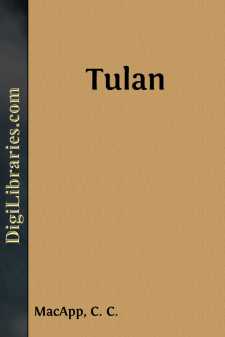Categories
- Antiques & Collectibles 13
- Architecture 36
- Art 48
- Bibles 22
- Biography & Autobiography 813
- Body, Mind & Spirit 142
- Business & Economics 28
- Children's Books 17
- Children's Fiction 14
- Computers 4
- Cooking 94
- Crafts & Hobbies 4
- Drama 346
- Education 46
- Family & Relationships 57
- Fiction 11829
- Games 19
- Gardening 17
- Health & Fitness 34
- History 1377
- House & Home 1
- Humor 147
- Juvenile Fiction 1873
- Juvenile Nonfiction 202
- Language Arts & Disciplines 88
- Law 16
- Literary Collections 686
- Literary Criticism 179
- Mathematics 13
- Medical 41
- Music 40
- Nature 179
- Non-Classifiable 1768
- Performing Arts 7
- Periodicals 1453
- Philosophy 64
- Photography 2
- Poetry 896
- Political Science 203
- Psychology 42
- Reference 154
- Religion 513
- Science 126
- Self-Help 84
- Social Science 81
- Sports & Recreation 34
- Study Aids 3
- Technology & Engineering 59
- Transportation 23
- Travel 463
- True Crime 29
C. C. MacApp
C. C. MacApp was the pen name of American science fiction writer Carroll Mather Capps, active primarily in the 1960s and early 1970s. He was known for his imaginative and adventurous space operas, with notable works including "Subb" and "The Mercurymen." MacApp's stories often appeared in popular science fiction magazines like "Galaxy" and "If". His writing frequently explored themes of politics, power struggles, and the human condition in futuristic and alien settings.
Author's Books:
Sort by:
by:
C. C. MacApp
To disobey the orders of theCouncil of Four was unthinkableto a Space Admiral of the oldschool. But the trouble was,the school system had changed.A man, a fighter, an Admiralhad to think for himself now, ifhis people were to live. While facing the Council of Four his restraint had not slipped; but afterward, shaking with fury, the Admiral of the Fleets of Sennech slammed halfway down the long flight of...
more...
by:
C. C. MacApp
It all began when the new bookkeeping machine of a large Midwestern coffin manufacturer slipped a cog, or blew a transistor, or something. It was fantastic that the error—one of two decimal places—should enjoy a straight run of okays, human and mechanical, clear down the line; but when the figures clacked out at the last clacking-out station, there it was. The figures were now sacred; immutable;...
more...



